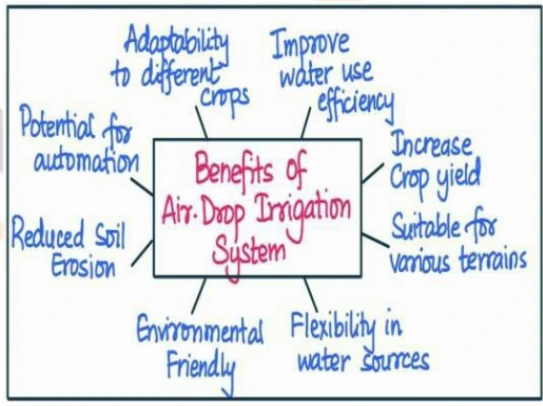Answer:
|
How to approach the question
- Introduction
- Write briefly about the airdrop irrigation method
- Body
- Discuss the benefits of airdrop irrigation.
- Address suitability for arid and water-scarce regions in India and explore additional advantages for India’s context.
- Mention the probable challenges and limitations.
- Conclusion
- Give an appropriate conclusion in this regard.
|
Introduction
Airdrop irrigation is a specialized technique used to deliver water directly to plant roots in a precise and efficient manner through suspended pipes and emitters that harvest moisture out of the air to irrigate crops by producing large amounts of condensation. The water is then pumped and released as droplets or a fine mist onto the roots of plants.
Body
Benefits of Air-drop Irrigation System

- Improved water use efficiency and water conservation: Airdrop irrigation allows for targeted water delivery directly to the plant roots, ensuring that water reaches the intended areas without wastage. This minimises evaporation losses and reduces runoff, resulting in significant water savings compared to conventional irrigation methods. Example- In Australia, more efficiently.
- Increased crop yields: Better nutrient uptake and healthier plant growth lead to increased crop yields and improved agricultural productivity. Example- In New Zealand, air-drop technology has been used to target specific areas of forests with pest control measures.
- Suitable for various terrains: Airdrop irrigation can be adapted to different topographies and terrains, making it suitable for a wide range of agricultural landscapes. Example- In parts of sub- Saharan Africa, where infrastructure for irrigation is limited, air-drop systems have been used to provide water and nutrients to remote smallholder farms,
- Flexibility in water sources: It can utilize alternative water sources such as treated wastewater or brackish water, reducing reliance on freshwater supplies and expanding irrigation possibilities in water-scarce regions.
- Reduced soil erosion: By delivering water directly to the roots, airdrop irrigation minimizes surface runoff, helping to reduce soil erosion and preserve the quality of arable land.
- Environmentally friendly: Airdrop irrigation contributes to environmental sustainability by conserving water resources, minimizing chemical runoff, and reducing the energy requirements associated with pumping and distributing water. Example- In Canada, air-drop technology has been used for reforestation after forest fires.
- Adaptability to different crops: Airdrop irrigation can be customized to meet the specific water requirements of different crops, enabling efficient irrigation management for various agricultural practices.
- Potential for automation: Airdrop irrigation systems can be integrated with automated control systems, enabling precise scheduling and monitoring of water delivery. This automation allows for efficient irrigation management, reducing manual labour and improving overall system performance.
Suitability for arid and water-scarce regions in India
- Water scarcity: India faces significant water scarcity issues, particularly in arid and semi-arid regions that lie left of the Isohyte line. Also, more than 80% groundwater extracted inIndia goes to agricultural activities with high wastage.
- Diverse agricultural landscape: India has diverse agricultural practices and crop types across different regions. Airdrop irrigation can be customized to suit various crops and field conditions, making it adaptable to the diverse agricultural landscape of the country.
- Alternative water sources: India has been exploring the use of alternative water sources such as treated wastewater and brackish water for irrigation. Airdrop irrigation can easily be adapted to utilize these alternative water sources, reducing dependence on freshwater supplies and expanding irrigation possibilities in water-stressed areas.
- Small-scale farming: 85% of Indian farmers are small-scale farmers who face challenges related to limited access to water resources. Airdrop irrigation offers a flexible and scalable solution that can be adapted to small farming systems, enabling farmers to optimize water usage and improve agricultural productivity even with limited water availability.
Challenges and limitations:
- Initial installation costs can be higher compared to traditional methods.
- Regular maintenance and farmer training are necessary for optimal system performance.
- Ongoing research and technological advancements are addressing challenges, making airdrop irrigation more accessible and cost-effective.
- Airdrop irrigation can enhance water use efficiency, increase agricultural productivity, and promote sustainable farming practices in India.
Way Forward:
- Provide training and capacity-building programs to farmers, technicians, and operators to ensure the proper use and maintenance of air-drop irrigation systems.
- Conduct research and development to customize air-drop irrigation systems to suit Indian conditions, crops, and landscapes.
- Initiate pilot projects and demonstrations to showcase the effectiveness of air-drop irrigation systems to farmers, agricultural experts, and policymakers.
- Evaluate the economic feasibility of air-drop irrigation systems for different crops and farming systems. Assess the cost-effectiveness of adopting this technology
- Establish monitoring and evaluation systems to assess the impact of air-drop irrigation on water use efficiency, crop yields, and land restoration.
Conclusion:
In conclusion, the significance of airdrop irrigation in India cannot be overstated. With the country grappling with water scarcity and the need to sustainably manage its agricultural resources, airdrop irrigation offers a game-changing solution. By conserving water, improving water use efficiency, and enhancing crop productivity, airdrop irrigation has the potential to revolutionise farming practices in India. It not only addresses the challenges of water scarcity but also contributes to food security, economic growth, and environmental sustainability, making it a vital tool for the future of Indian agriculture.
To get PDF version, Please click on "Print PDF" button.


Latest Comments